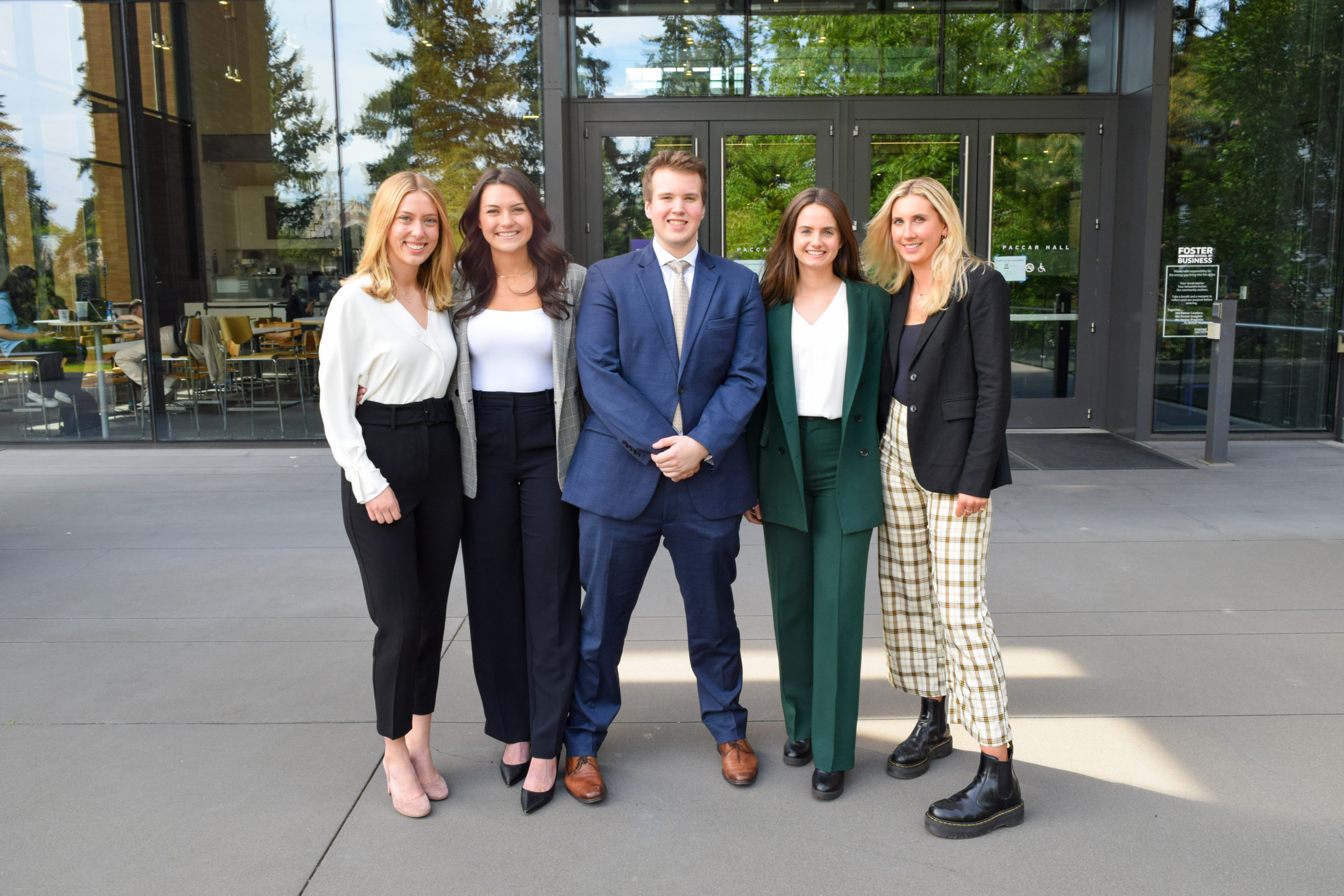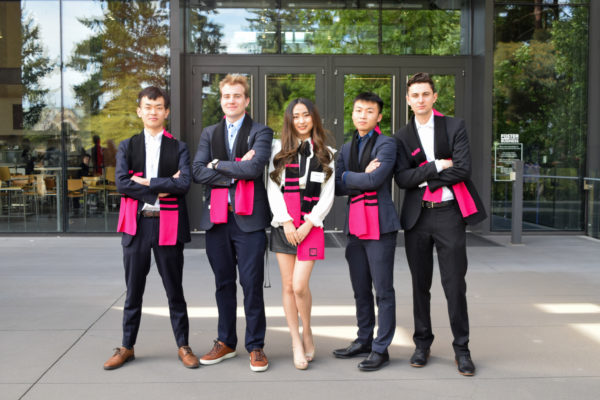T-Mobile: A Charge Towards SMB Market Share Growth
Written by Brittany Do
Every quarter, you can expect to find graduating seniors rushing around Paccar Hall in a flurry of excitement and nerves fully dressed in business professional attire. On Friday, May 27th, this was no different. There were 290 students, 50 judges, and 55 volunteers for MGMT 430, Strategic Management capstone class that finishes with a case competition. All students have the opportunity to work in a team of four or five to review a case, conduct relevant research, brainstorm solutions, analyze alternatives, and provide a live recommendation to a panel of judges. Throughout the quarter, each student spends numerous hours preparing their team’s solution for the competition; in turn, they develop applicable skills like teamwork, analytical thinking, and public speaking.
“This was a tremendous experience and I was very happy to be able to take part in it. The case in particular, forced me to think in a different way and truly consider all possibilities, alternatives, and outcomes. It was very nice to see the culmination of the work my teammates and I have done, during our time at Foster come to fruition. I have no doubt that the analysis and critical thinking I learned will be of use to me in my professional career. It was a lot of fun and further taught me many skills such as financial analysis, strategy, and teamwork. The case competition was the perfect way to complete my Foster experience before I graduate.” – Trent Arkley
Teams are asked to build a solution for a company to achieve their goals, and this quarter the Foster School of Business collaborated with T-Mobile on a case written by Ussama Ahmad Khan and advised by Rick McPherson. Students were asked to answer a key question: How does T-Mobile for Business grow its small and medium-sized business (SMB) business and position itself with the SMBs in the wireless industry?
“The open-ended nature of the prompt was initially daunting, but seeing our idea evolve into a full-fledged presentation after days of work was a very rewarding experience. Regardless of the industry, the ability to find and present solutions remains vitally important. The Strategy Development Case Competition provides an opportunity to hone these skills before entering the workforce.” – Brendan Szymanski
Each team has twelve minutes to present their solution, alternatives, implementation timeline, and financial analysis. After the team concludes, the panel of judges has eight minutes to ask the team questions to expand on their recommendation and better understand how they reached that conclusion. Finally, the judges have five minutes to provide each team with feedback.
All 60 teams presented in the preliminary round of presentations and had an opportunity to network with the judges during the lunch break. Then, 12 teams moved forward to the final round and presented to the judges one last time. There is one winning team from each final round room. An award ceremony concludes the day, where Foster’s Dean Frank Hodge spoke and the judges announced the three winning teams.
The three winning teams were
- D3: Kiersten Diercks, Lindsey Lovsted, Hannah Lukomski, Ricardo Ruiz, and Kendall Smith
- I3: Trent Arkley, Stephen Cheng, Ryan Fitzgerald, Michael Jeon, and Emily Shih
- K5: Kara Cunningham, Claire Pickering, Katie Snider, Allison Kearney, and Brendan Szymanski.

Team D3’s solution was the T-Mobile Magenta Business Unlimited that targeted increasing SMB market share. The company would adjust its current pricing model and advertise it to SMBs to rapidly grow its market share by providing cybersecurity, third party business solutions, and fewer lines. Team I3 suggested promoting T-Mobile as a one-shop-stop for all SMBs business solution needs. The SMBs would have the flexibility, cost savings, and convenience they need for their respective businesses. As for Team K5, their solution consisted of a T-Mobile for Business Partner Program with Qualtrics. Through this partnership, T-Mobile would be better able to support SMB needs.

“The Strategy Development Case Competition afforded me the opportunity to develop critical thinking skills while solving real business challenges. I also learned how to succeed in a group setting and effectively present my group’s ideas. All of these skills I will take forward with me in my professional career.” – Allison Kearney
Overall, all teams performed extraordinarily well, and this capstone class has left a lasting impact on the graduating seniors for the next chapter of their lives. Below are additional reflections from students.

“Entering a strategic development case competition like this accelerated my ability to think critically and prepared me for situations that we don’t encounter everyday but could possibly be a life-changing career opportunity. In addition, this experience gave me a chance to work with peers who major in a variety of Foster professions where we reached conclusions through sharing perspectives through different areas of knowledge, and ultimately introduced our strategic development for T-Mobile.” – Emily Shih
“Being able to work alongside classmates both cooperatively within my team and competitively against other teams was an overall rewarding and educational experience that I am thankful to be able to participate in. The opportunity to work on a set of real-world problems from a company as established as T-Mobile was a great precursor to graduation, and I want to thank both T-Mobile and UW Foster for providing students with this excellent case competition!” – Ryan Fitzgerald
“Participating in the Strategy Development Case Competition was a great conclusion to my time as a student at the Foster School of Business. This case provided a great opportunity to work hard with a fantastic team on an issue that seemed daunting at first. We sharpened each other’s critical thinking skills, applied knowledge from our different option classes, and improved our public speaking skills.” – Hannah Lukomski
“Competing in the Strategy Development Case Competition forced me to think outside of the box while utilizing all the skills I have learned throughout my career in the Foster School of Business. The process of creating an idea, strengthening it by asking challenging questions, and collaborating with my teammates to tell a compelling story has laid a solid foundation for me to begin my professional career.” – Kara Cunningham
